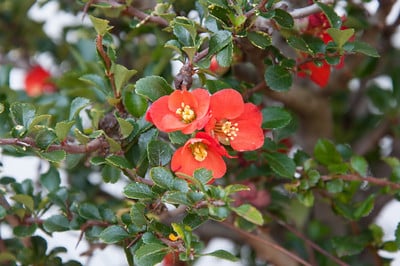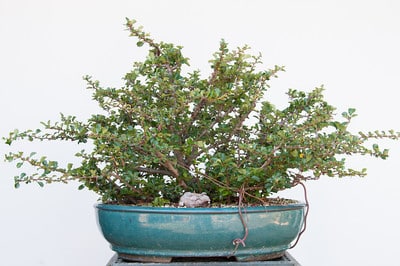Most work on Japanese flowering quince ‘chojubai’ is done in fall or spring, but one task – beyond watering and fertilizing – requires some attention year-round. Removing flowers.

Japanese flowering quince ‘chojubai’ in July
Chojubai mostly bloom in late winter and early spring, but some specimens can produce flowers – and fruit – year-round. I appear to have one of those specimens.

Chojubai flower
I adore the flowers and list chojubai among my favorite varieties but try hard to remove buds and blossoms whenever I see them. This prevents fruit from forming and draining the tree of energy I’d rather be applied to new branches.

After removing buds and flowers
The flowers in the first photo developed over two weeks after the previous plucking, and just days after removing the last remnants of color, new buds appeared.
As Michael Hagedorn has become quite taken with the variety, I recommend checking Crataegus.com for more about the variety, and do take note of some of the best the variety has to offer in Michael’s post, Diminutive Jewels.
Subscribe to Bonsai Tonight
New Posts Delivered Every Tuesday and Friday
Leo says
Yes, but what does this shrub have to do with bonsai?
Bruce Winter says
I too am taken with chojubai but fungus goes after them like no other. I’m about to give up growing them.
Alex V says
You are completely correct Leo, that is not a bonsai. Be sure to avoid this species and leave them for the rest of us.
Jonas I seem to have a similar problem, my chojubai produces flowers and fruit pretty much all year long. It always breaks my heart to pull off the blooms but I have been diligent and gotten a lot of branch growth. I suspect if I am not careful half of my plants could end up being chojubai.
Cheers.
Juan says
Leo, it starts with “In the Beginning……”. Jonas yours has become much denser than I remember it. Have you been growing out and cutting back? I haven’t touched mine, just letting it grow. I remember Akio saying that these are best started from root cuttings, but haven’t tried it myself. Love the Chojubai.